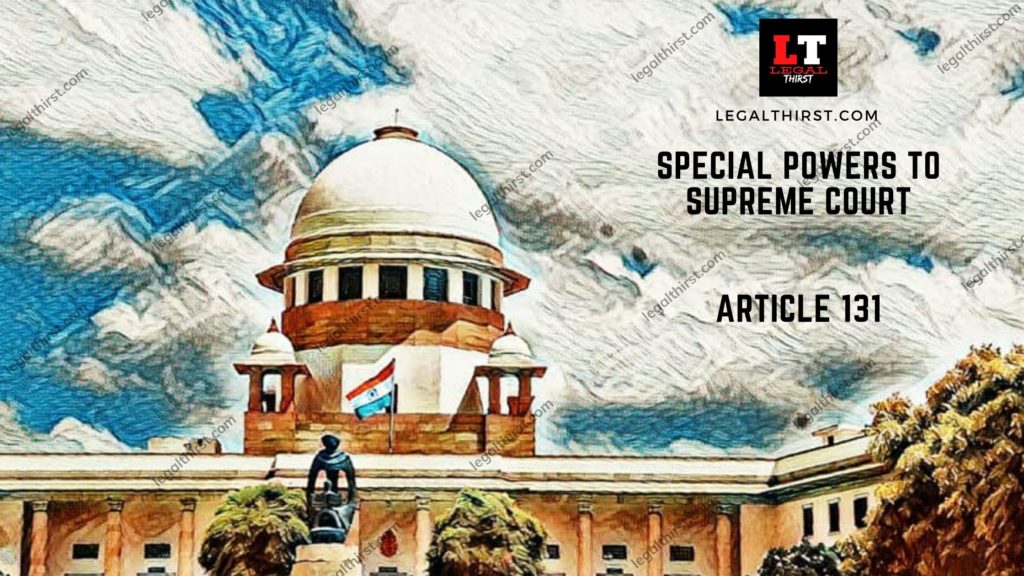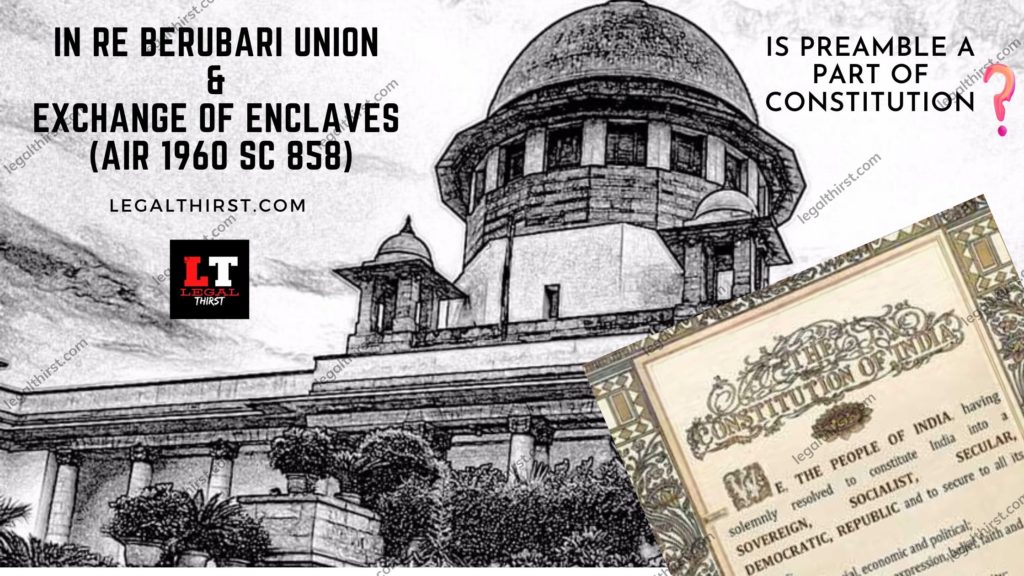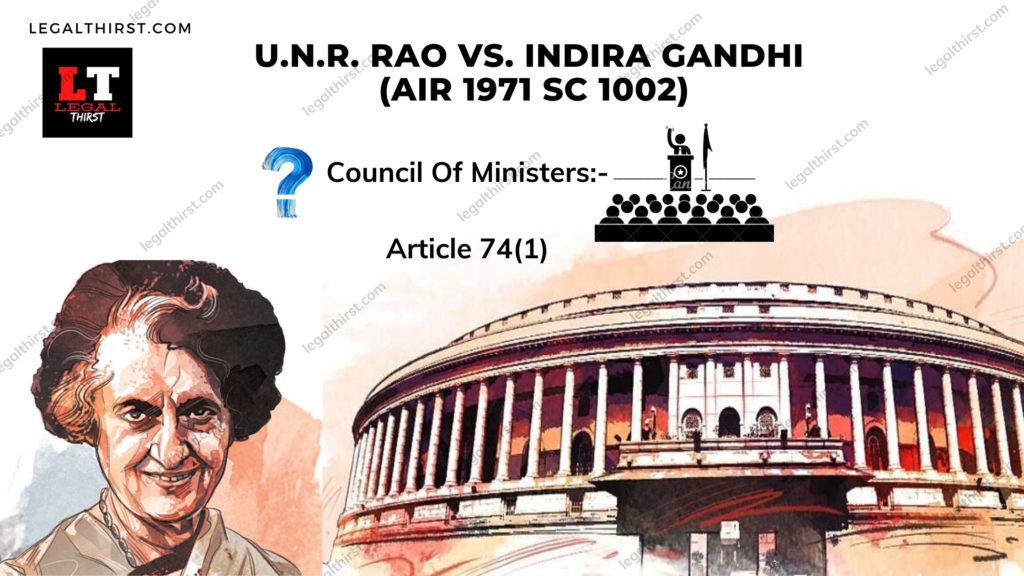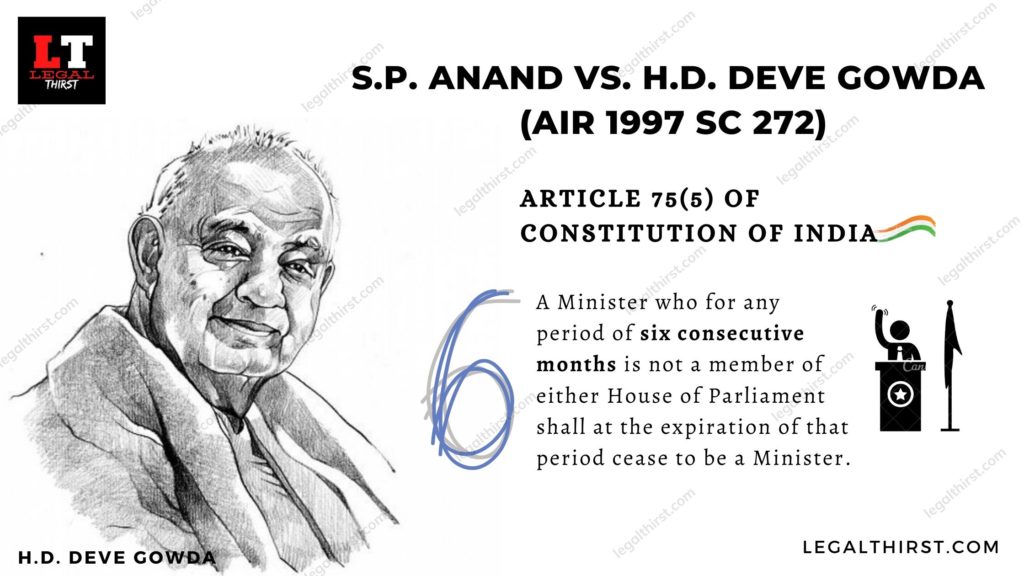Keshavnanda Bharti Vs. State of Kerala AIR 1973 SC 1461
Article 368 : Doctrine of Basic Structure
Article 368 deals with the Powers of the Parliament to amend the Constitution and procedure therefor. It states Procedure through which Parliament can amend by way of addition, variation or repeal of any provision of the Constitution in accordance with the procedure established (Clause 1).

Subject Involved
The validity of the 24th, 25th, 29th amendments to the Constitution of India was challenged. The main question related to the nature, extent, and scope of amending power of the parliament under the Constitution.
Decision
[Theory of basic structure] Constitution can be amended only to the extent of and in accordance with the provisions of Art.368. Some of the provisions of the constitution of India form its basic structure which is not amendable by parliament by its constituent the power under art.368.
Remarks
See also Indira Nehru Gandhi v. Raj Narain AIR 1975 sc 2299, Minerva mills ltd. V. UOI AIR 1980 SC1789 & L.Chandra Kumar v. UOI AIR 1997 SC 1125
State of West Bengal Vs. UOI (AIR 1963 SC 1241)
Article 131: It confers exclusive jurisdiction on the Supreme Court in disputes involving States, or the Center on the one hand and one or more States on the other. This means no other court can entertain such a dispute.

Subject Involved
Nature of Indian Constitution – Federal, Unitary, Quasi Federal.
- Contract, or Agreement between independent & sovereign units to surrender partially their authority in favor of the union;
- the supremacy of Constitution;
- Distribution of Powers between Center & State;
- The supreme authority of courts to interpret the Constitution.
Decision
The power of Union to Legislate in respect of property situated in the states even if the states are regarded qua the union as sovereign, remained unrestricted. The right of the center to require the province to part with property for the effective performance of Central functions cannot be considered as detracting from provincial autonomy.
Remarks
In this case majority held that Constitution is not truly federal & states are not sovereign. However, Subba Rao, J. In his dissent treats it basically federal.
Ram Jawaya Kapur Vs. State of Punjab (AIR 1955 SC 1241)
Article 73 & 162, Article 19 (1)(g) & 19(6):

Subject Involved
Theory of separation of power;
Article 73 & 162 of the constitution of India; in the absence of law, the state cannot monopolize any trade or business to the total or partial exclusion of citizens under Article 19(6) of the constitution.
Decision
The petitioners have no fundamental right which can be said to have been infringed by the action of the government, the petition is bound to fail on that ground. Further, the petitioner has no fundamental right under Article 19(1)(g) & the quest. Whether the govt.
Could establish a monopoly without any legislation under 19(6) of the constitution is altogether immaterial.
In Re Berubari Union & Exchange of Enclaves (AIR 1960 SC 858)
Article 3(c) & Article 368: Supreme Court in 1969 ruled that settlement of boundary dispute between India and any other country doesn’t require a constitutional amendment, it can be done by executive action (govt action), if it doesn’t involve cession of territory.

Subject Involved
Power to cede away Indian territory in favor of a foreign country – Whether permissible; Procedure.
Decision
The power to diminish the area of a state does not entitle parliament to cede Indian territory to a foreign state. Parliament has no power article 3(c) to make a law to implement an agreement with the government of a foreign state ceding Indian territory to a foreign State. Area Diminished under Article 3(c) should & must continue to be a part of the territory of India. An amendment of the Constitution, under Article 368, to modify the First schedule to the constitution, is necessary for ceding Indian territory to a foreign state.
Remarks
- Ram Kishore sen v. UOI AIR 1966 SC 644,
- UOI v. Sukumar Sengupta AIR 1990 SC 1692
Ram Kishore Sen Vs. UOI (AIR 1966 SC 644)
90th amendment Act of 1960: It amends article 332 of the Constitution, in clause (6), it inserted;
“Provided that for elections to the Legislative Assembly of the State of Assam, the representation of the Scheduled Tribes and non-Scheduled Tribes in the constituencies included in the Bodoland Territorial Areas District, so notified, and existing prior to the constitution of the Bodoland Territorial Areas District, shall be maintained”.

Subject Involved
Constitution (Ninth Amendment) Act, 1960-Transfer of certain areas to Pakistan in fulfillment of India-Pakistan Agreement
Decision
The advisory opinion given by the apex court in In Re Berubari Union & exchange of Enclaves AIR 1960 SC 858 was binding. After receipt of the advisory opinion in the Re Berubari case, the parliament passed the constitution (9th) Amendment Act, 1960 to give effect to the Indo-Pak Agreement. The validity of the amendment was challenged alleging that the language of it so far as it related to Berubari Union no. 12 was confusing and incapable of implementation. It was also contended that the transfer of the Berubari Union would result in deprivation of citizenship and property without compensation.
UOI Vs. Sukumar Sengupta AIR 1990 SC 1692
Articles 1, 3, 368, and Constitution (Ninth Amendment)Act,1960 Constitution (Ninth Amendment) Act, 1960- Transfer of certain areas to Pakistan in fulfillment of India-Pakistan Agreement.

Subject Involved
Constitution of India, 1950: Articles 1, 3, 368, and Constitution (Ninth Amendment) Act 1960, Agreements of 1974 & 1982, Implementation of Teen Bigha Whether involves cession of Indian territory to Bangladesh Sovereignty over Dahagram & Angarpota, Whether arises.
Decision
The Supreme court held that lease in perpetuity of Teen Bigha in favor of Bangladesh did not amount to the cessation of Indian territory and hence legislation not required.
U.N.R. Rao Vs. Indira Gandhi
(AIR 1971 SC 1002)
Article 74(1):- It makes it mandatory to have a Council of Ministers and President would act on the advice of them.

(AIR 1971 SC 1002)
Subject Involved
Is it essential to have a council of Ministers under Article 74(1) even at the time when the House of the People has been dissolved or its term has expired?
Decision
Article 74(1) is mandatory and, therefore, the President cannot exercise the executive Power without the aid and advice of the Council of Ministers. It is essential to have a Council of Ministers under Article 74(1) even at the time when the house of the people has been dissolved or its term has expired. As a result, the appeal fails and dismissed by the court]
Remarks
Note:- Also read with Article 52, Article 53(2), Article 75(1), 75 (2), Article 85 (2) & Representation of Peoples Act ,1951.
S.P. Anand Vs. H.D. Deve Gowda (AIR 1997 SC 272)
Article 14, Article 21 & Article 75, 75(5):
Article 75(5) says:- A Minister who for any period of six consecutive months is not a member of either House of Parliament shall at the expiration of that period cease to be a Minister.

Subject Involved
Can a person who is not a member of either of the House be appointed as the Prime Minister of India
Decision
[Petition Dismissed] As per the observations made Article 75(5) permits the president to appoint a person who is not a member of either House of Parliament as a Minister, including a Prime Minister subject to the possibility of his commanding the support of the majority of the members of Lok sabha.
Remarks
Article 75(5) requires the person to be the member for at least 6 consecutive months .
